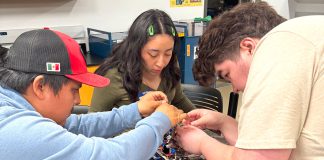CALIFORNIA — Hundreds of new bills signed into law last year have taken effect Jan. 1 in California, including historic measures to expand worker protections, tackle the state’s housing crisis, redress historical injustices, increase voter access and more.
“In partnership with the Legislature, we’ve advanced hundreds of new bills this year to make meaningful progress on an array of issues that matter deeply to Californians across the state,” said Gov. Gavin Newsom in a news release Dec. 29. “I thank Pro Tem Atkins and Speaker Rendon for their leadership in advancing historic measures to improve the lives of Californians, including new tools to boost our housing supply, improve workplace conditions and build a stronger state.”
Among the whopping 770 new laws now in effect statewide are nation-leading protections for workers and important measures to increase the state’s supply of affordable housing, create a more inclusive state, expand voter access and protect consumers and the environment from harmful chemicals.
Following is some of the new laws for 2022:
Worker protections
AB 701 establishes nation-leading transparency measures for companies to disclose warehouse production quota descriptions and prohibits the use of algorithms that disrupt basic worker rights.
SB 62 ends the garment industry’s practice of piece-rate compensation and expands fashion brands’ liability for unpaid wages.
Affordable housing
SB 8 extends the provisions of the Housing Crisis Act of 2019 through 2030 to accelerate the approval process for housing projects and curtail local governments’ ability to downzone, among other provisions.
SB 9 facilitates the process for homeowners to build a duplex or split their current residential lot.
SB 10 creates a voluntary process for local governments to implement streamlined zoning for new multi-unit housing near transit or in urban infill areas.
Inclusivity and equity
AB 1084 requires retail department stores to provide a gender-neutral section for toys and child care items.
SB 65, the California Momnibus Act, takes effect in August 2022 and helps tackle racial and ethnic disparities in maternal health outcomes by improving research and data collection.
AB 101, upon appropriation of funds by the Legislature, requires high schools to provide ethnic studies starting in academic year 2025-26 and make completion of a one-semester course a high school graduation requirement beginning with students graduating in 2029-30.
AB 245, as part of the Donahoe Higher Education Act, requires universities and colleges to update a former student’s records to include the student’s updated legal name or gender if the institution receives government-issued documentation.
Voter access
AB 37 makes permanent the measure implemented last year to send a vote-by-mail ballot to every active registered voter.
Food and beverage
SB 389 allows restaurants, bars, breweries and wineries that sell food to continue offering to-go alcoholic beverages with food orders, building on state regulatory relief announced last June.
AB 652 bans the use of toxic PFASs in products for children, such as car seats and cribs.
AB 1200 prohibits the use of toxic PFASs in disposable food packaging.
AB 286 makes it unlawful for a food delivery platform to charge a customer any purchase price, as defined, for food or beverage that is higher than the price posted on the food delivery platform’s internet website by the food facility at the time of the order. The bill also requires a food delivery platform to pay any tip or gratuity for a delivery order, in its entirety, to the person delivering the food or beverage, and to pay any tip or gratuity for a pickup order, in its entirety, to the food facility.
AB 1276 prohibits restaurants from handing out single-use silverware or condiments without a customer requesting them.
Police and crime
SB 2 creates a system within the Commission on Peace Officer Standards and Training (POST) to investigate and revoke or suspend peace officer certification for serious misconduct.
SB 16 expands public access to police misconduct records related to unreasonable or excessive use of force, discriminatory or prejudiced behavior and other misconduct.
AB 600 ensures that crimes targeting people due to their immigration status are considered a hate crime.
AB 1003 makes the intentional theft of wages, including gratuities, in an amount greater than $950 from any one employee, or $2,350 in the aggregate from two or more employees, by an employer in any consecutive 12-month period punishable as grand theft.
AB 3 defines a “sideshow” event in California as “an event in which two or more persons block or impede traffic on a highway, for the purpose of performing motor vehicle stunts, motor vehicle speed contests, motor vehicle exhibitions of speed, or reckless driving, for spectators,” and strengthens penalties for violations tied to the illegal street takeovers beginning July 1, 2025. Once in effect, a person convicted of exhibition of speed during a sideshow could potentially have their driver’s license suspended for 90 days to six months.
AB 48 prohibits police from using rubber bullets or tear gas to disperse crowds at protests.
Miscellaneous laws
AB 855 removes Columbus Day as a judicial holiday and replaces it with Native American Day in September.
AB 338 allows the placement of a monument in Capitol Park honoring Sacramento-area tribes, replacing the sculpture of missionary Junipero Serra.
SB 41 establishes the Genetic Information Privacy Act, which requires a direct-to-consumer genetic testing company to provide a consumer with certain information regarding the company’s policies and procedures for the collection, use, maintenance and disclosure of genetic data, and to obtain a consumer’s express consent for collection, use or disclosure of the consumer’s genetic data.
AB 974 requires anyone under age 18 to wear a helmet when riding a horse, mule or donkey on a paved highway. The bill also requires all riders or their equines to wear a lamp or reflective gear during rides after dark.
AB 1282 allows the establishment of animal blood banks for veterinarian use, much like people donate blood to blood banks.
For full text of the new legislation, visit http://leginfo.legislature.ca.gov.














